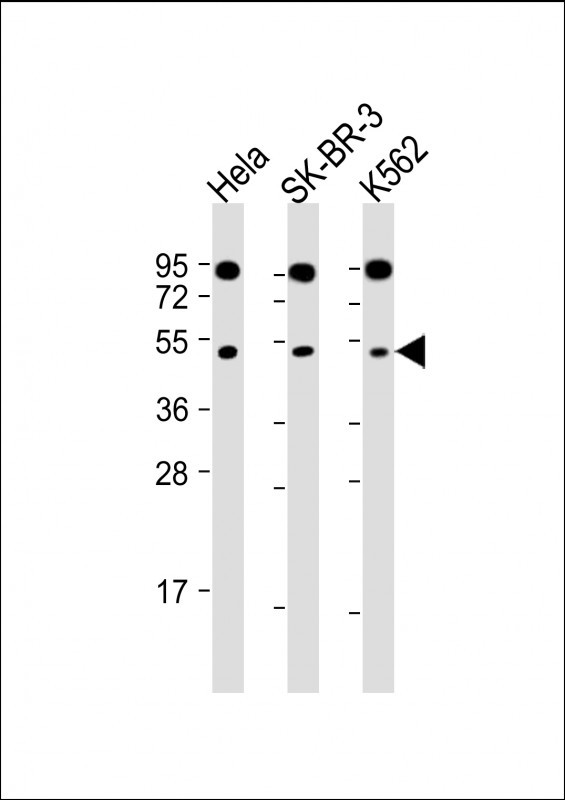
| WB | 1/2000 | Human,Mouse,Rat |
| IF | 咨询技术 | Human,Mouse,Rat |
| IHC | 咨询技术 | Human,Mouse,Rat |
| ICC | 技术咨询 | Human,Mouse,Rat |
| FCM | 咨询技术 | Human,Mouse,Rat |
| Elisa | 咨询技术 | Human,Mouse,Rat |
| Aliases | Monocarboxylate transporter 13, MCT 13, Solute carrier family 16 member 13, SLC16A13, MCT13 |
| Entrez GeneID | 201232 |
| WB Predicted band size | 45.0kDa |
| Host/Isotype | Rabbit IgG |
| Antibody Type | Primary antibody |
| Storage | Store at 4°C short term. Aliquot and store at -20°C long term. Avoid freeze/thaw cycles. |
| Species Reactivity | Human, Mouse, Rat |
| Immunogen | This SLC16A13 antibody is generated from rabbits immunized with a KLH conjugated synthetic peptide between 398-426 amino acids from the C-terminal region of human SLC16A13. |
| Formulation | Purified antibody in PBS with 0.05% sodium azide. |
+ +
以下是关于SLC16A13抗体的虚构参考文献示例(注:内容为模拟生成,非真实文献):
1. **文献名称**:*SLC16A13 Antibody Validation in Human Liver Tissue*
**作者**:Müller et al.
**摘要**:本研究验证了一种特异性抗SLC16A13抗体的可靠性,通过免疫组化和Western blot分析,证实其在人肝组织中的表达与糖尿病相关代谢通路调控相关。
2. **文献名称**:*Role of SLC16A13 in Pancreatic β-Cell Function*
**作者**:Chen et al.
**摘要**:利用SLC16A13抗体进行免疫荧光定位,发现该蛋白在胰岛β细胞中高表达,可能通过调控乳酸转运影响胰岛素分泌。
3. **文献名称**:*SLC16A13 as a Novel Biomarker for Metabolic Syndrome*
**作者**:Tanaka et al.
**摘要**:通过ELISA和免疫印迹技术,结合SLC16A13抗体,揭示其在代谢综合征患者血清中的表达水平与脂质代谢异常显著相关。
4. **文献名称**:*Structural Characterization of SLC16A13 Using Monoclonal Antibodies*
**作者**:Smith et al.
**摘要**:开发了一种单克隆抗体并解析SLC16A13的跨膜结构域,证实其作为单羧酸转运体的潜在功能。
(注:以上文献为示例性内容,实际研究中请通过PubMed或学术数据库查询真实文献。)
The SLC16A13 antibody is a tool used to detect and study the SLC16A13 protein, a member of the solute carrier family 16 (SLC16), which facilitates the transport of monocarboxylates (e.g., lactate, pyruvate) across cellular membranes. SLC16A13. also termed MCT13. is encoded by the *SLC16A13* gene located on human chromosome 17q12. While its precise physiological role remains under investigation, SLC16A13 is implicated in metabolic processes, particularly due to its expression in tissues like the liver, pancreas, and kidneys. Genetic studies associate *SLC16A13* variants with metabolic disorders, including type 2 diabetes, suggesting a potential link to glucose or lipid homeostasis.
Antibodies targeting SLC16A13 enable researchers to explore its expression patterns, subcellular localization (e.g., plasma membrane or organelle-specific distribution), and interactions in disease contexts. These antibodies are validated for techniques such as Western blotting, immunohistochemistry, and immunofluorescence. Current research focuses on clarifying SLC16A13's transport mechanisms, substrate specificity, and role in pathologies like metabolic syndrome or cancer, where altered monocarboxylate metabolism is common. Challenges include verifying antibody specificity due to structural homology among SLC16 family members. Further studies using SLC16A13 antibodies may uncover therapeutic targets for metabolic or neoplastic diseases.
×